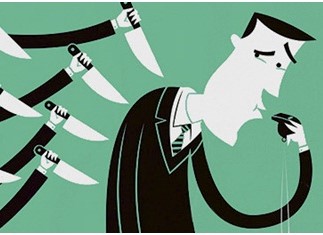- Siddhi Shubhangi
In the current scenario where the immoral and
unethical practises are increasing day by day, the need of whistle blowing is
gaining immense importance. Whistle blowing is a term which is not so popular,
and people mostly do not know about it. Whistle blowing refers to the process
in which a person from the organisation tells someone else about an illegal or
unethical practise in the hope that someone will do something to change that
particular practise.
Mainly, there are two types of whistle blowing, internal and external. Most of
the cases, internal whistle blowing prevails, where the employees tell someone
within the company or workspace about the practise. It happens within the
organisation so that no bad name comes to the organisation. This is also called
internal reporting. But, it becomes a serious issue for the organisation when
it comes to external whistle blowing. Where the organisation discourages the
internal reporting, bad and immoral practises, often someone motivated by
conscience feels that they should report to the media and press or the
government about the matter. This is external reporting.
There is such a vast range of corruption that even if people are trying to
correct that then either they are threatened or blackmailed or they are
murdered or killed in a brutal manner. People have an idea that it is same as
making complain, but it is different. A complaint is normally related to
individual at a personal level. It is generally in the form of grievance but a
whistle blowing normally relates to something that may not personally impact on
the individual but surely impact on either the employer or the third party. The
whistle blowers are brave personalities of our society, who are not safe in
India. They are always in dangerous situation once they decide to fight back.
The legislation is provided regarding the whistle blowing but is not so active
and properly developed in India due to high level of corrupted people. Under
the 'Employment Rights Act, 1996' if an employee "blows the whistle"
they will be protected from being dismissed or victimised because of their
whistle blowing.
Some
of the excellent examples are here discussed in the article.
Firstly, Narendra Kumar, he was an IPS Officer who joined the service in
2009 and was posted in Madhya Pradesh in early 2012. Morena was the district
famous for fine quality of sand found in Chambal River bed which was used for
construction. But in the past years there have been reports regarding the
illegal rampant mining. In March, 2012 he received information about the
illegal mine stones being taken away by a tractor. When he tried to stop it he
was run over by the tractor. This is a brutality of the nation.
Secondly, Satyendra Dubey, he graduated from IIT, Kanpur. After doing
masters from IIT, BHU, he joined Indian Engineering Service (IES) and in July,
2002, went on a nomination to the National Highway Authority of India (NHAI).
He turned into the Project Director at Koderma, Jharkhand and was in charge of
dealing with an area of NH-2 (GT Road). In the wake of uncovering genuine
monetary abnormalities, he got the contractual worker of the venture to suspend
three of his architects. He had the contractual worker modify 6 km. of
Under-quality Street, an enormous misfortune for the street contract mafia. On
27 November 2003, Dubey didn't arrive home subsequent to coming back from a
wedding in Varanasi. His driver went to search for him and discovered his dead
body which was shot. He had been confronting a few dangers following his
activity against debasement at Koderma, as per the police's FIR after his
murder.
Thirdly, not directly, but somewhere or the other even recent Gauri
Lankesh is also coming into picture, as she also tried to speak against the
practises and was brutally killed.
Lastly, there was Lalit Mehta, who was an RTI activist and also a member in the
Right to Food Campaign in Jharkhand. He tried and exposed scams in the National
Rural Employment Guarantee Act (NREGA) using his RIGHT to Information. In 2008,
while travelling back to Chatarpur on his motor bike he was attacked and
killed. He was strangled and his face was all smashed so that he is deformed
and it is beyond recognition. The national RTI Forum started a Lalit Mehta RTI
Gallantry Award in his honour.
The above list is a compilation of only a fraction of whistle blowers in India.
In the past years many whistle blower have allegedly been harassed and jailed
for exposing corrupt activities while many gave away their lives for doing the
right thing. There are various leaders like Arvind Kejriwal, Subramanian Swami
etc. who are facing difficulties because they are trying to make India a
healthy and developed country but are stopped by these dirt in our systems.
People and citizens should support these practises rather than discouraging
them. When all will come forward regarding this matter our country will
automatically will be respected across the globe. In conclusion,
whistle-blowing can be beneficial and harmful all in the same aspect.


